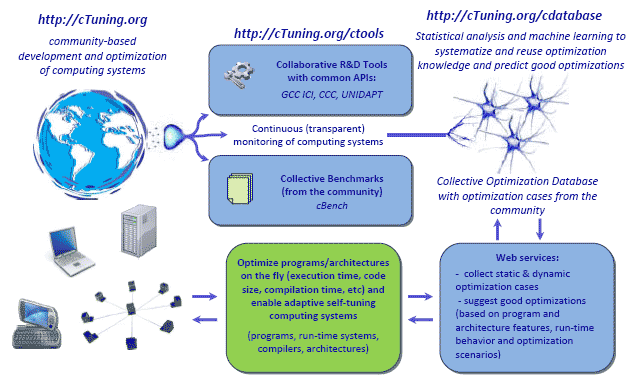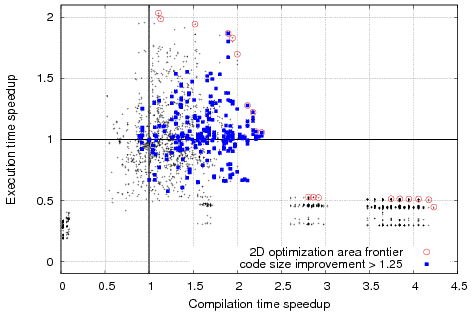From cTuning.org
| Line 36: | Line 36: | ||
| valign="top" | | | valign="top" | | ||
{{News1| | {{News1| | ||
| + | |||
| + | * '''2010.September.10''' - The CFP for the [http://grow2011.inria.fr 3rd International Workshop on GCC Research Opportunities (GROW 2011)] co-located with [http://www.cgo.org/cgo2011 CGO 2010] (early April 2011, Chamonix, France) is now available [http://grow2011.inria.fr/index.php?option=com_content&view=article&id=48&Itemid=54 on-line]. Please, follow our announcements about GROW 2011 and submit your best papers!.. | ||
* '''2010.August.24''' - Congratulations to Mircea et al for the paper [http://unidapt.org/index.php/Dissemination#MCFP2010 Practical Aggregation of Semantical Program Properties for Machine Learning Based Optimization] accepted to [http://www.public.asu.edu/~ashriva6/esweek2010/cases2010 CASES 2010]. This work has been integrated with [http://cTuning.org/milepost-gcc MILEPOST GCC] and [http://cTuning.org/ctuning-cc cTuning CC]. | * '''2010.August.24''' - Congratulations to Mircea et al for the paper [http://unidapt.org/index.php/Dissemination#MCFP2010 Practical Aggregation of Semantical Program Properties for Machine Learning Based Optimization] accepted to [http://www.public.asu.edu/~ashriva6/esweek2010/cases2010 CASES 2010]. This work has been integrated with [http://cTuning.org/milepost-gcc MILEPOST GCC] and [http://cTuning.org/ctuning-cc cTuning CC]. | ||
Revision as of 09:34, 13 September 2010
|
cTuning.org - free, open source, collaborative repository and tools for program and architecture characterization and optimization. It may not always be visible to the IT users, but developing and optimizing current and emerging computing systems using available technology is excessively inefficient, time consuming and costly. During last several decades, many research papers have been published with suggestions about how to easily solve all these problems! Unfortunately, we often struggled replicating those results in realistic environments or finding stable practical tools based on these research papers. Therefore, we decided to create this collaborative Collective Tuning wiki-based portal to develop free common open-source extensible collaborative infrastructure, benchmarks and collective optimization repository based on multiple research techniques and production tools to parametrize, abstract, automate and simplify program, compiler and architecture design and optimization using collective tuning, run-time adaptation, statistical and machine learning techniques. This technology minimizes repetitive time consuming tasks and human intervention: even though there is still a lot to be done, we are glad to see it helping several companies, end users and researchers to improve execution time, code size, power consumption, reliability and other important characteristics of the available computing systems ranging from supercomputers to mobile systems automatically. cTuning web-site and infrastructure is totally free and is now maintained and extended collaboratively and voluntarily by its users (basically by you). It is an on-going project, so please be patient or join the effort by sharing optimization data, extending tools, exchanging ideas, referencing this work, etc. We created cTuning.org because we believe in collaborative and public nature of R&D and because we would like to change trends in academic IT research intended to publish myriads of similar papers often non-reproducible results and without releasing tools to avoid competition.
Current design of our Collective Optimization Framework:  We developed Collective Optimization Database to continuously collect a large number of optimization cases from the community to learn how to correlate program features, program and system behavior and good optimizations between multiple programs, datasets, compilers, operating systems and architectures. This repository is also intended to improve the quality of academic research by avoiding costly duplicate experiments and providing reproducible results. cTuning open-source infrastructure is still far from solving all optimization problems but we hope that it already opens up some interesting collaborative R&D opportunities to the community to develop intelligent self-tuning adaptive computing systems. We hope that cTuning-like technology will one day eventually improve production compilers that we use including GCC, LLVM, Rose source-to-source tool, Open64, IBM XL and Testarossa, HMPP directive based compiler for hybrid multicore systems, Intel compiler suites, and operating systems including Moblin, Android, standard desktop/server Linux distributions, Windows, cloud/distributed operating systems and so on. We would like to thank all cTuning colleagues and users who are or have been helping with this project. Note: cTuning is an ongoing evolving project - please be patient and tolerant to the community. You are warmly welcome to join cTuning community to help us parametrize and automate code, compiler and architecture design and optimization! We are participating in the following collaborative activities:
Motivation example: Example of complex optimization search spaces for susan_c (including optimization space frontier for multi-objective optimizations) from Collective Benchmark after using CCC framework (that has some similarities with the useful ACOVEA tool but also allows automatic sharing of optimization knowledge with the community in the Collective Optimization Database and uses plugins to implement various search techniques besides genetic algorithms) and cTuning CC/MILEPOST GCC 4.4.x:   Example of program similarities using static program features and based on best found program optimizations continuously collected in the cTuning optimization repository that improve execution time (as well as code size, compilation time, etc):   cTuning CC/MILEPOST GCC 4.4.x helps to correlate program features and optimizations using various machine learning techniques to quickly predict good optimizations for a previously unseen program. |
|







